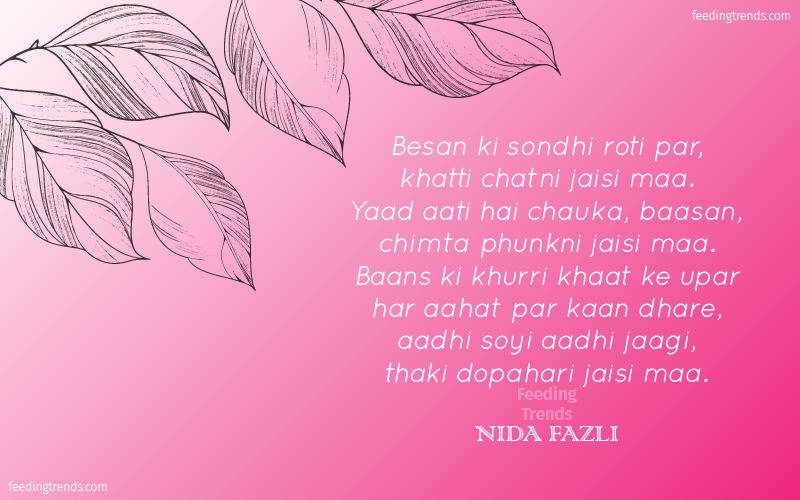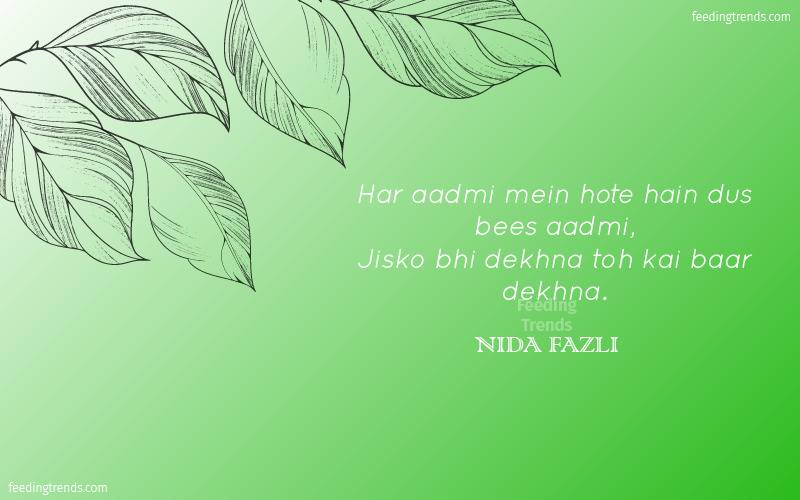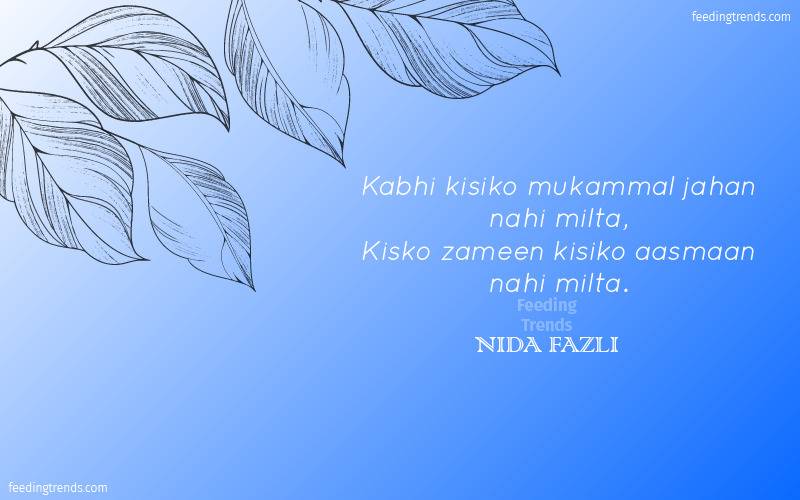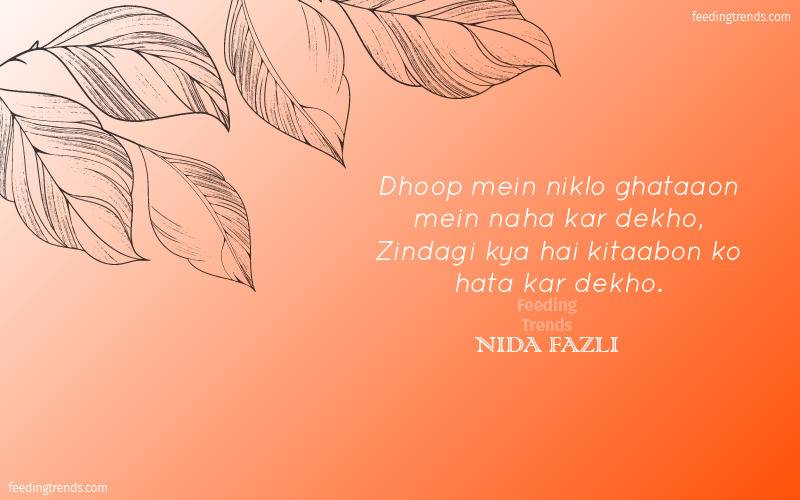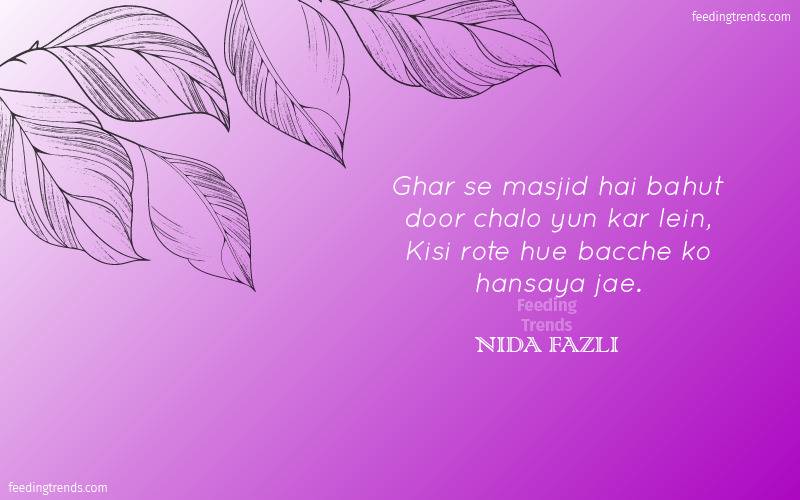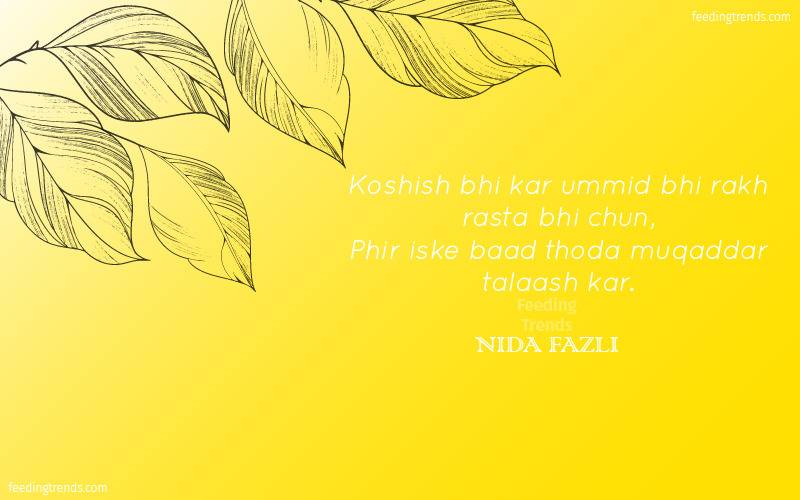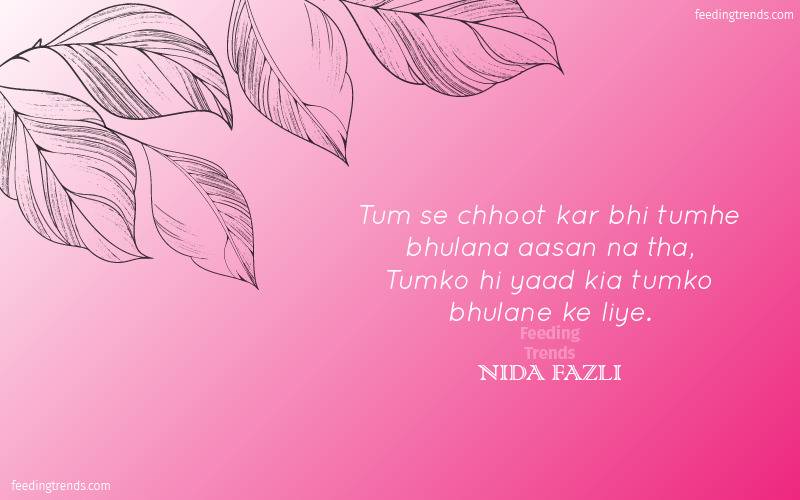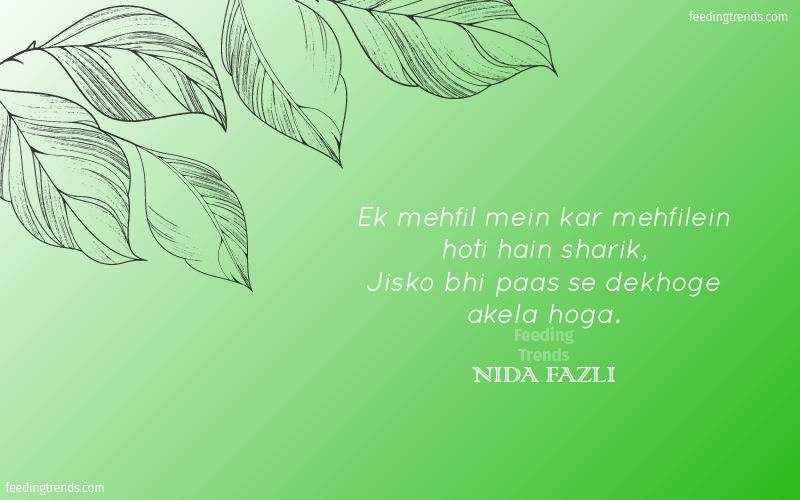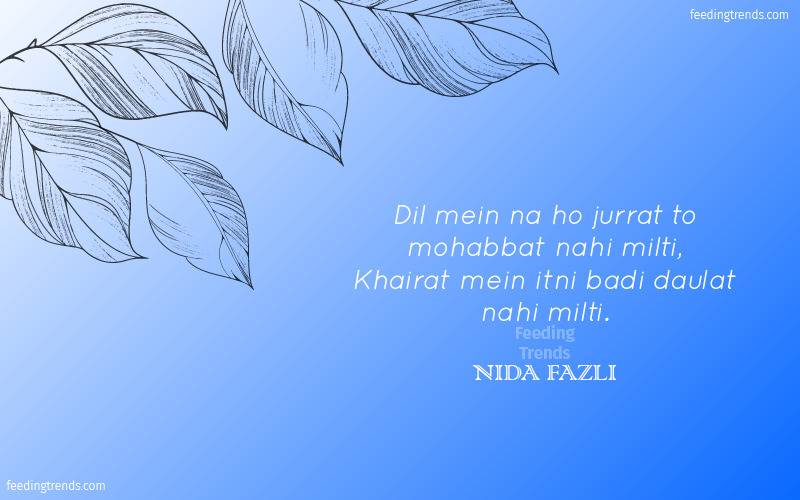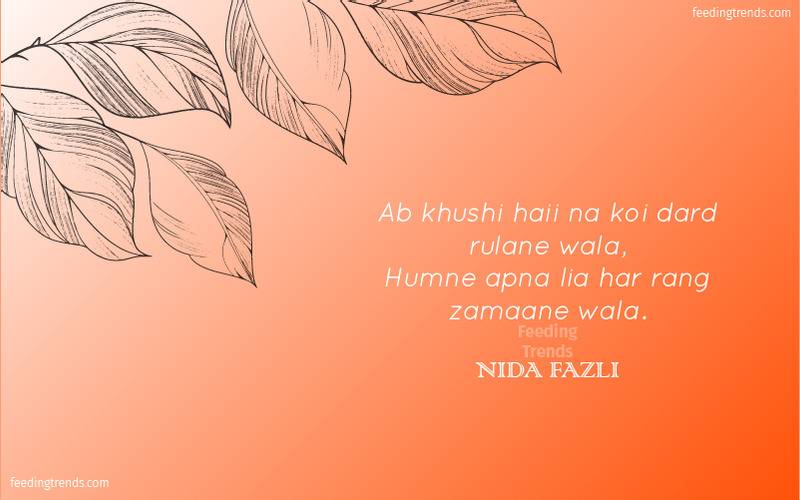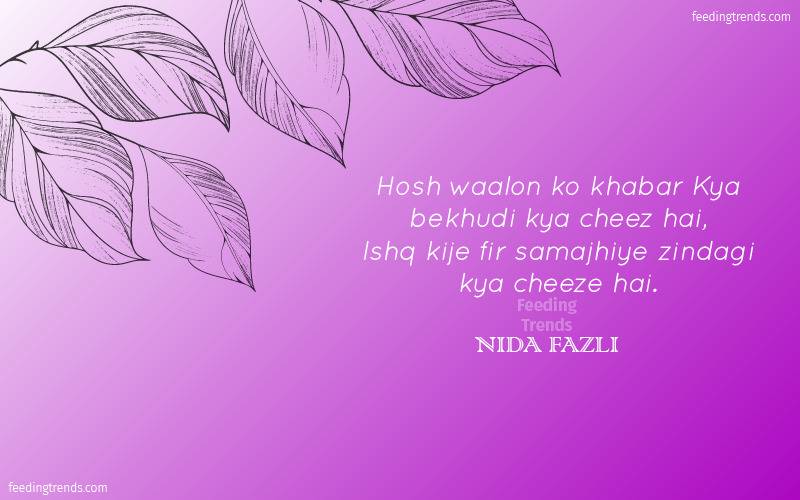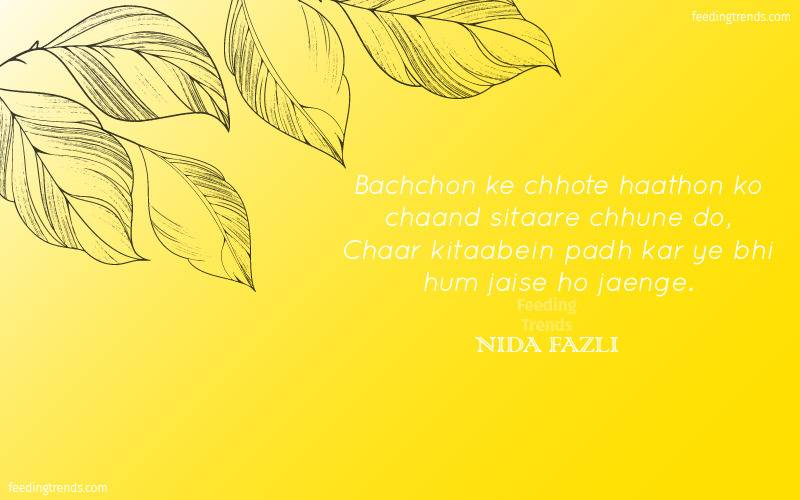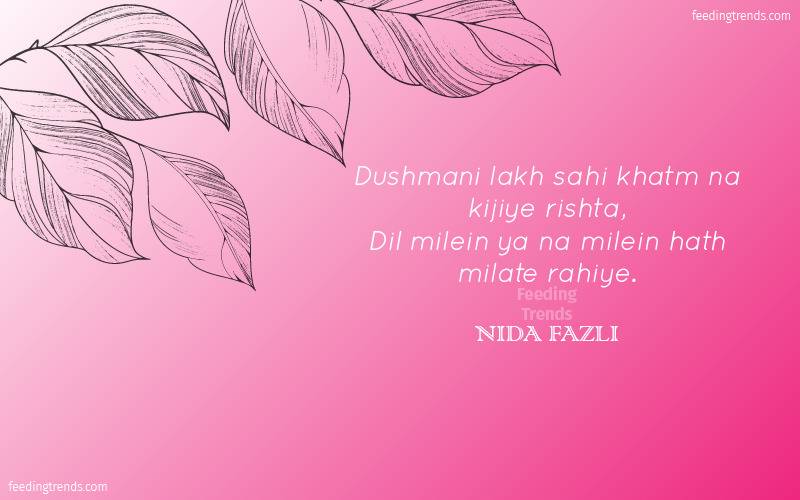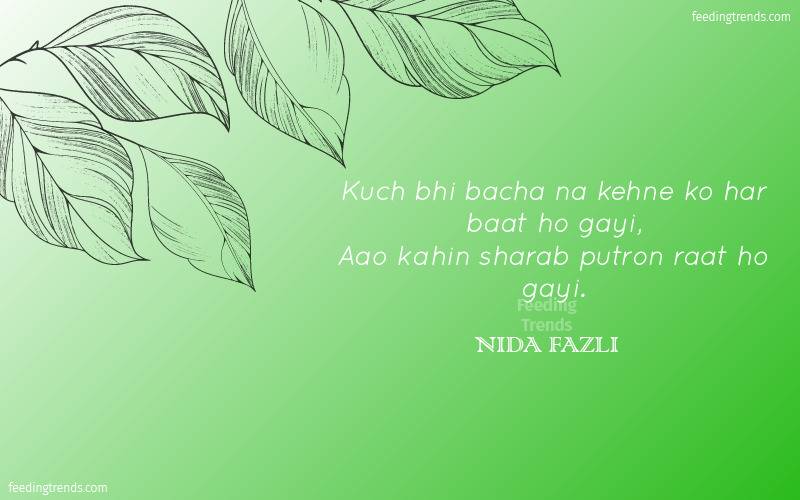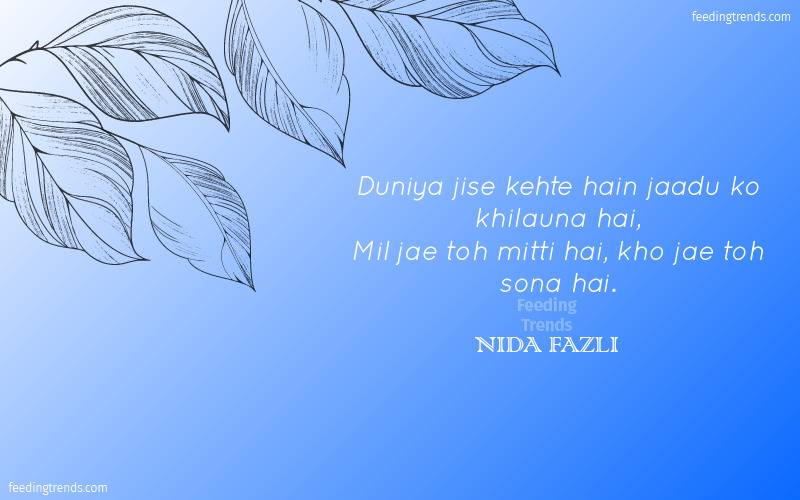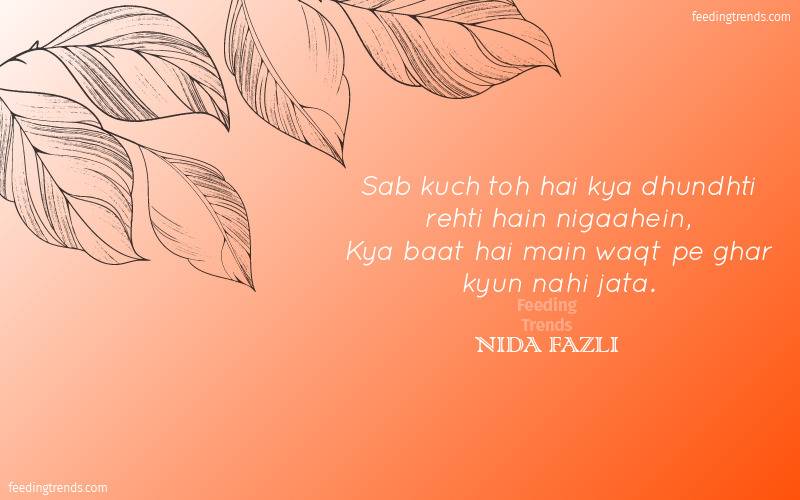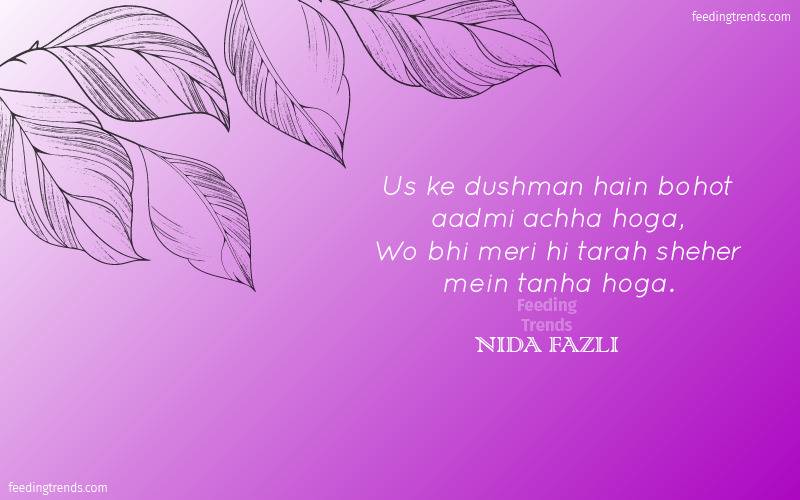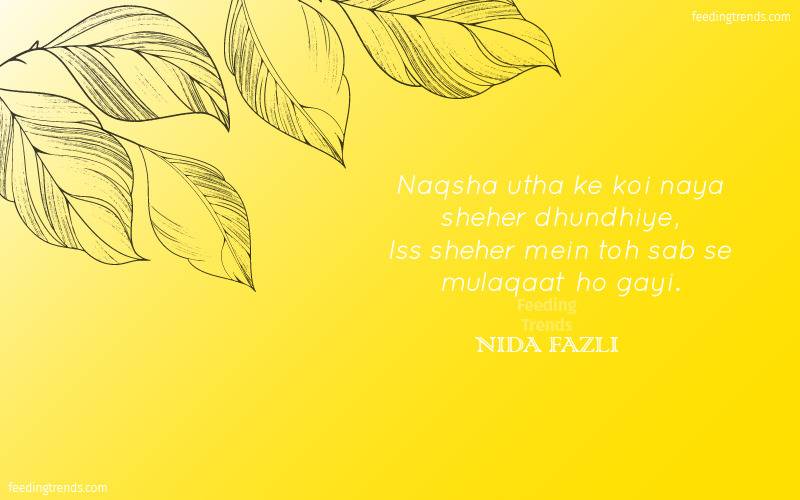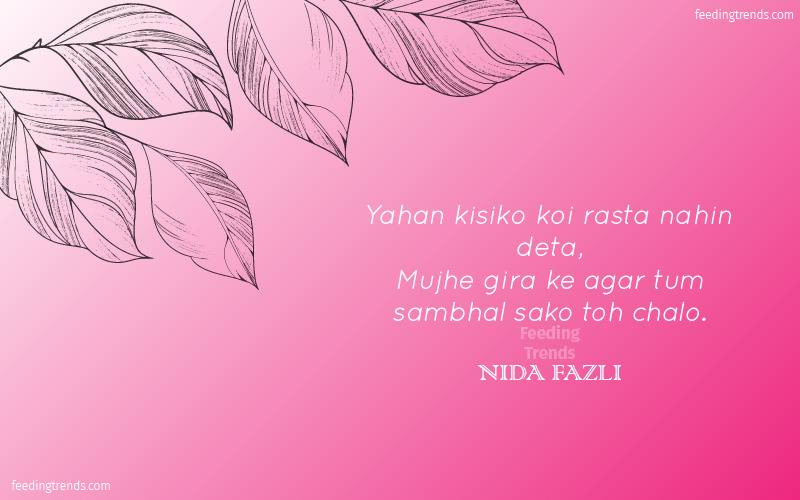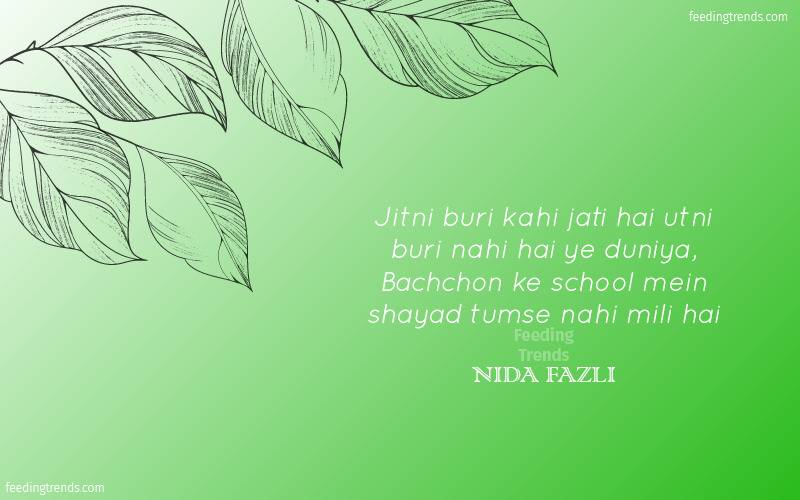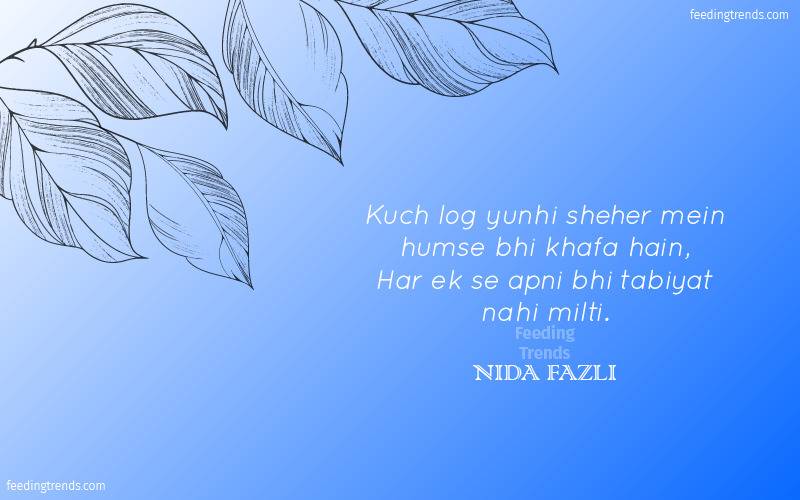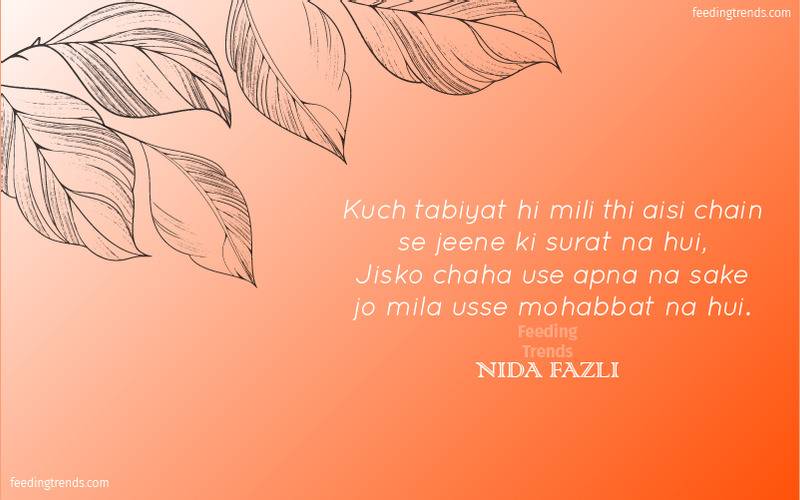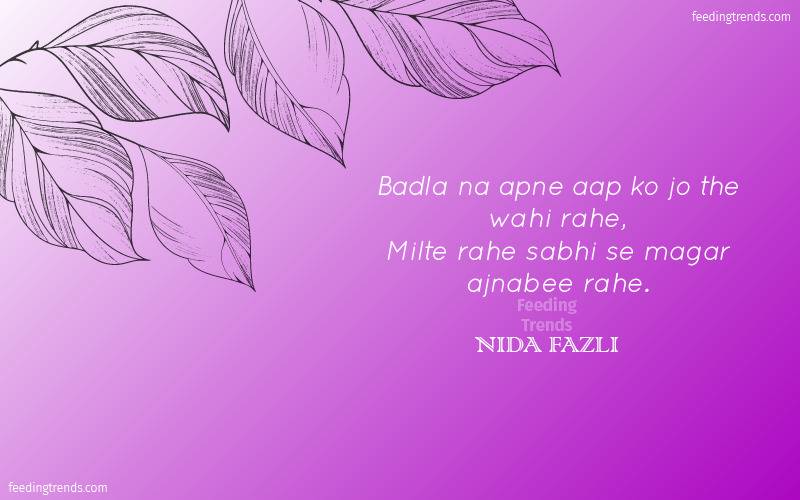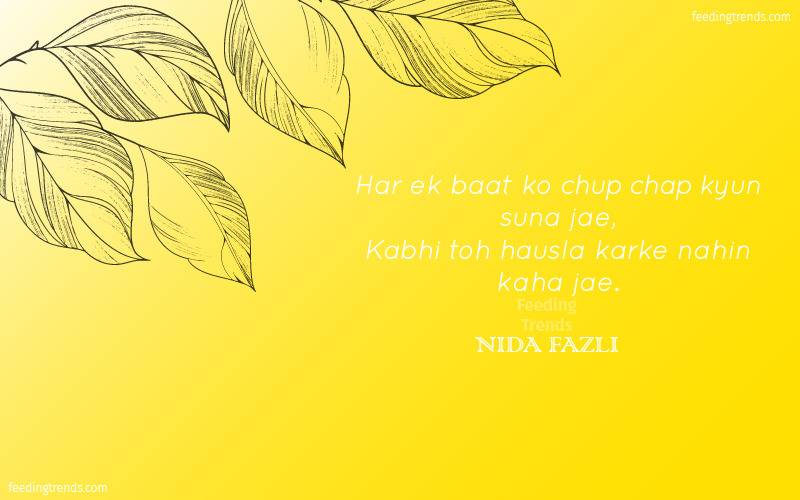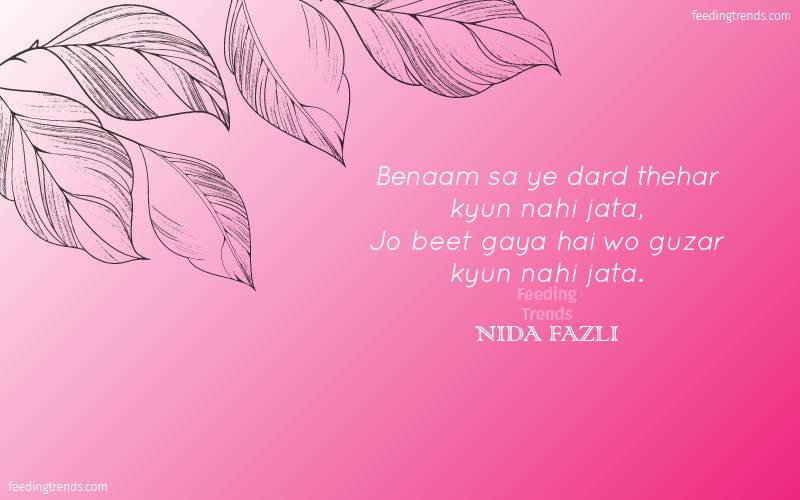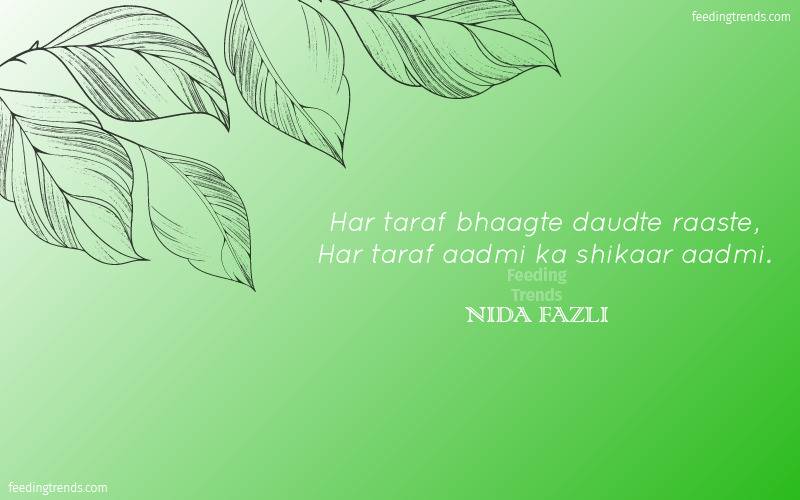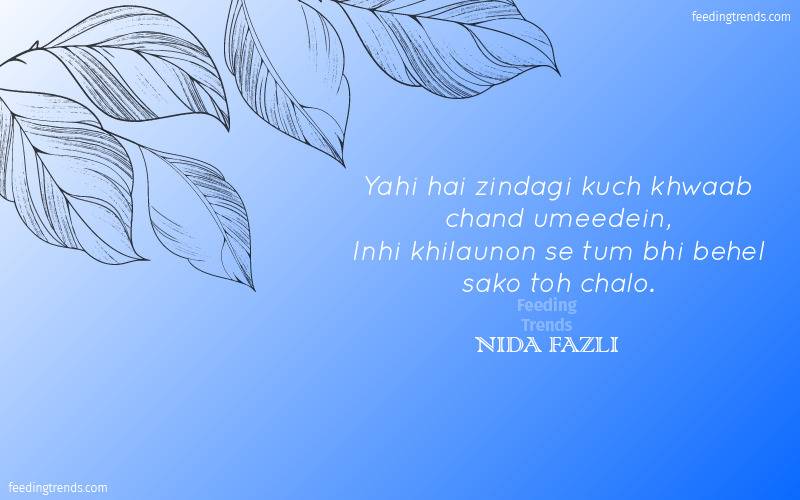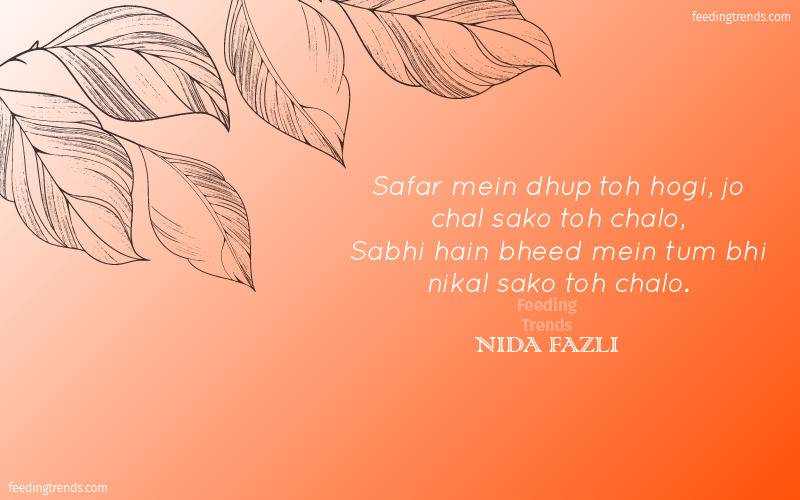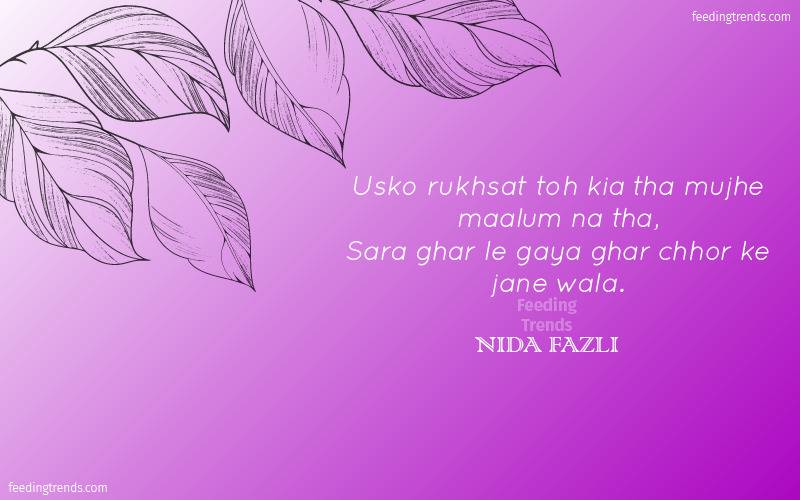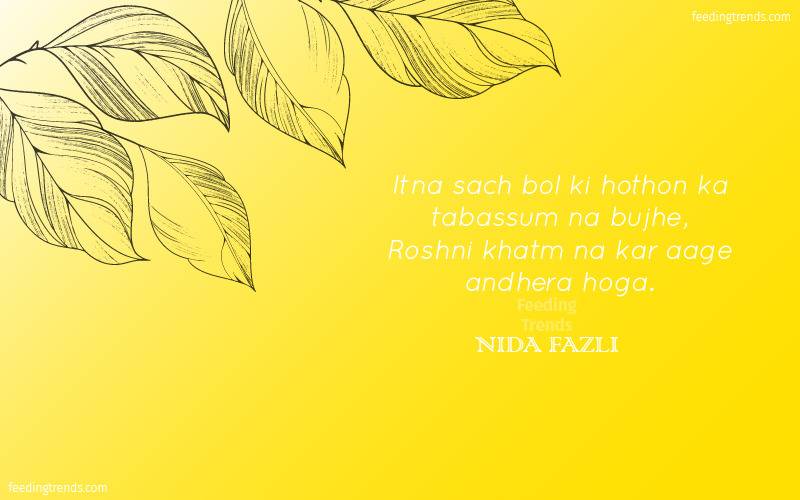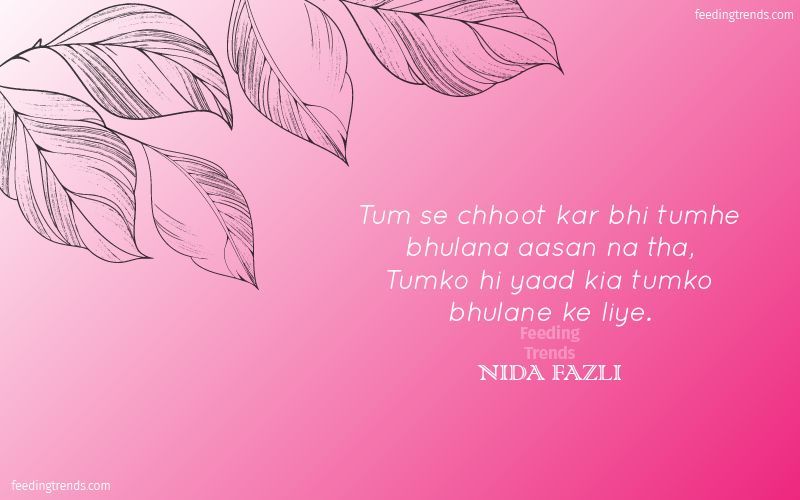
30 Nida Fazli’s Beautiful Poetries/Shayaris on Love, Passion, Innocence, and Struggles of Life
Nida Fazli endeavours all your heartfelt emotions from interpersonal relationships or politics or the daily struggles of human life, realism to optimism; all these diverse feelings are the hallmarks of his deeply moving poems.
Muqtida Hasan Nida, popularly known as Nida Fazli (12 October 1938- 8 February 2016), was a prominent Indian Hindi & Urdu poet, lyricist, and dialogue writer.
Nida Fazli’s Life and Background
Nida Fazli was born in Delhi into a Kashmir family. He grew up in Gwalior where he attended school and subsequently studied English Literature. Eighteen years after the partition of India, in 1965, his parents and other family members migrated to Pakistan, but he decided to stay in ‘Secular Hindustan' carrying the pain & repercussions of this epochal event all his life. He was married twice. His second wife was Malti Joshi.
So, the question arises, how come he started his career in writing poetry? Fazli epitomized the essence of Indian secularism. Well, the young Fazli was once fascinated by a composition of Surdas in which Radha, lover of Lord Krishna, was narrating his sorrow of being apart from her lover (Krishna) to her maids while passing by a temple.
Fazli began writing for Bollywood in the 1970s. Though he had become a known face in mushairas by then, success in tinsel town did not come easy. Fazli's first successful break came with the movie Aap To Aise Na The, released in 1980. The song 'Tu is tarah se meri zindagi me shamil hai' became an instant hit.
Padma Shree Nida Fazli wrote in his autobiography, “By the time my family migrated to Pakistan, I had become aware, a change of place (of residence) can’t be a solution to the problems of a person.”
“My problem with the progressive writers was that they completely abandoned the idea of God & left it to the discretion of religious fundamentalists & communal bigots.”, he had once told his writers.
“I follow the Sufi tradition because they brought God out of stone walls of temples & mosques. If we start ignoring Kabir & Amir Khusroo, we will soon have slogans like Naara-e-taqbeer & Har-Har-Mahadev echoing in every household.”, he said.
His soulful lyrics were credited for the success of many films like 'Tamanna', 'Sur', 'Is Raat ki Subah Nahin', 'Nakhuda', 'Gudiya' and 'Sarfarosh'.
His mesmeric words created magic when ghazal maestro Jagjit Singh teamed up with him for several albums. The duo had numerous hit ghazals to their name, from 'Duniya jise kehte hain, jadu ka khilona hai' and 'Garaj baras pyaasi dharti par' to 'Hoshwalon ko khabar kya'.
Shayari & Poetry by Nida Fazli
Now, just equip yourself with all your emotions residing deep inside your heart & dive into the dazzling ocean of love, passion, optimism, realism, and many more, packed inside the golden words of Nida Fazli's poetries.
1. Besan ki sondhi roti par, khatti chatni jaisi maa.
Yaad aati hai chauka, baasan, chimta phunkni jaisi maa.
Baans ki dhuri khatri khaati ke upar har aahat par kaan dhare,
aadhi soyi aadhi jaagi, thaki dopahari jaisi maa.
Nida Fazli has beautifully gathered various emotions carried by a mother in this coupler of his poetry 'Maa'. Mothers are one of the first indications of sovereignty of God in our lives. Here, the poet is comparing 'khatti chatni' with the mother as perhaps he wishes us to enlighten the sweet and tangy relationship we share with our mothers in our lives.
For higher education, seeking jobs or after getting married, most of us get distanced from our mothers & start living without her shade of love that is when we actually miss her and her unconditional love for us. No matter how old we grow up, we always love that comfort while sleeping in her lap, her food, her selfless affection towards us.
Nida Fazli has wisely dragged our attention from the chaotic messy life to that pampered child within us who somewhere got vanish in this struggle of life. He has here beautifully transformed the sweat of the mother selflessly working day & night for her family into the repenting tears of a kid who misses staying with his mother again to experience that love.
2. Har aadmi mein hote hain das bees aadmi,
Jisko bhi dekhna toh kai baar dekhna.
Nida here wishes us not to presume about any person just after our first encounter with him. Our souls are always pure & free from the negativities which we acquire during the life hustles. A person carries various personalities within himself.
He might seem happy to you in the first place, could be dying of pain and sorrow the other one. This coupler actually carries two different meanings at the same time. It at first warns you not to blindly trust a person’s good behavior towards you.
He might be pretending to be good in front of you but might be evil-minded. The poet also stops us to make our mind for a person who might be behaving not as per our expectation due to his personal reasons but could be the best one, you have ever met.
A baby is born with a soul carrying positivity & purity of love & innocence. But as he grows up, he comes to face various hardships and difficulties which transforms him into a different person from who he was.
As a person grows up, he acquires different lamina of shields and negativities to survive in this not-so-good world. So the poet demands us to uncover those blankets of acquired negativities before judging any person.
3. Kabhi kisiko mukammal jahan nahi milta,
Kisi ko zameen kisi ko aasmaan nahi milta.
Nida Fazli seems deeply touched by departing from his family during the India-Pakistan partition. His pain of not holding up all the glory of life, i.e., family, togetherness, parents, and love, can be very clearly heard from his couplet.
We grow up carrying a lot of aspirations of family, relationship, dream jobs, luxury, and many more, but do we find them getting all of them fulfilled.
Perhaps, the vacancy of our unachieved expectations is the clever plan of God which prevents dreaming & provokes us to keep on moving in life to achieve our goals.
4. Dhoop mein niklo ghataaon mein naha kar dekho,
Zindagi kya hai kitaabon ko hata kar dekho.
Realism is the hallmark of Nida Fazli's poetry. This coupler gives us the essence of the practicality of life which can’t be gained by theoretical knowledge. The beauty of experiencing the real world & the magic of sharing emotions with the loved ones and the divine nature is untouched by the ones who deny seeing the real world and are busy in their work.
5. Ghar se masjid hai bahut door chalo yun kar lein,
Kisi rote hue bacche ko hansaya jae.
Nida Fazli always discouraged the idea of division of population on the ground of religion & promotes the presence of being a human first. The above lines break the ideology of feeling the presence of God just in the worship places.
It gives a sweet message to us of worshipping the eternal presence of Supreme Power from the innocence of a baby to the charm of sharing love & happiness to the mankind.
6. Koshish bhi kar ummeed bhi rakh rasta bhi chun,
Phir iske baad thoda muqaddar talaash kar.
Nida Fazli's poetries are full of optimism. In these lines, he has described the sequential steps one should follow in order to achieve his dreams.
He asks us to be goal-oriented, try hard to chase our dreams, and believe in ourselves & then after giving all our efforts to achieve our ambition, we must leave the outcome to destiny.
Any step skipped or the order reversed will lead to unfavorable results. The poet, Nida Fazli, glooms the hidden message for us, to be The captain of our fate'.
7. Tum se chhoot kar bhi tumhe bhulana aasan na tha,
Tumko hi yaad kia tumko bhulane ke liye.
This couplet describes the remembrance as the golden chain which brings two people’s hearts together even when not physically close.
Here the poet repents of not overcoming from the thoughts of his lover and has beautifully described the irony of how he tends to remember his loved one, to forget her.
8. Ek mehfil mein kayi mehfilein hoti hain sharik,
Jisko bhi paas se dekhoge akela hoga.
Nida Fazli here has wisely depicted the harsh reality of our society in the above couplet.
We pretend to be happy and to be the one who we are not in reality, on the social media platforms, or in the human gathering but we are always alone in ourselves with our thoughts and perceptions.
We are always in fear of sharing it with the people around us.
9. Dil mein na ho jurrat to mohabbat nahi milti,
Khairat mein itni badi daulat nahi milti.
Fazli has splendidly penned this soulful couplet which glorifies the love as the biggest asset one can achieve in his life.
One should be valiant enough to gain this beautiful feeling from the other person and to be lucky enough to experience this wonderful charm in one’s life.
10. Ab khushi hai na koi dard rulane wala,
Humne apna lia har rang zamaane wala.
Nida conveys this realistic approach of creating happiness from within instead of relying upon external reasons.
He has wisely penned the mantra of being in our world of happiness and not to distrust the inner peace by the surroundings and asks us to pace forward with this pretentious world.
11. Hosh waalon ko khabar kya, bekhudi kya cheez hai,
Ishq kije fir samajhiye, zindagi kya cheez hai.
Fazli was a lyricist as well, and this couplet is from a very well-known ghazal of the movie Sarfarosh. He has stated the mesmerizing feel of being in love as being fantasized in a different world.
The spellbound lover gets to know the actual meaning of life and happiness by diving into the vast ocean of affections and fondness.
12. Bachchon ke chhote haathon ko chaand sitaare chhune do,
Chaar kitaabein padh kar ye bhi hum jaise ho jaenge.
In this poetry, Nida Fazli has exquisitely asked us to protect the innocent dreams of childhood from the fiery and disastrous mature adulthood.
This Urdu poetry urges us the let children free and allow them to explore the limits of the sky.
13. Dushmani lakh sahi khatm na kijiye rishta,
Dil milein ya na milein hath milate rahiye.
Nida Fazli penned this most important note for everyone in the above couplet. Relations are like pearls in the ocean of life, which are very hardly found.
So, they must be carefully preserved. No matter how much relations get complicated because of the indifferences between the opinions, they shouldn’t be ended ever.
14. Kuch bhi bacha na kehne ko har baat ho gayi,
Aao kahin sharab putron raat ho gayi.
15. Duniya jise kehte hain jaadu ko khilauna hai,
Mil jae toh mitti hai, kho jae toh sona hai.
16. Sab kuch toh hai kya dhundhti rehti hain nigaahein,
Kya baat hai main waqt pe ghar kyun nahi jata.
17. Uske dushman hain bohot aadmi achha hoga,
Wo bhi meri hi tarah sheher mein tanha hoga.
18. Naqsha utha ke koi naya sheher dhundhiye,
Iss sheher mein toh sab se mulaqaat ho gayi.
19. Yahan kisiko koi rasta nahin deta,
Mujhe gira ke agar tum sambhal sako toh chalo.
20. Jitni buri kahi jati hai utni buri nahi hai ye duniya,
Bachchon ke school mein shayad tumse nahi mili hai duniya.
21. Kuch log yunhi sheher mein humse bhi khafa hain,
Har ek se apni bhi tabiyat nahi milti.
The above Nida Fazli poetry reflects the diversity that exists in the human world. We live in a society but society is made up of many kinds of people. Some like to lament, some like to share a laugh.
Some like to comment, others like to praise. Some like to meet and greet, some like stay aloof. And so, we always tend to be with people who match with our tastes and personality.
22. Kuch tabiyat hi mili thi aisi chain se jeene ki surat na hui,
Jisko chaha use apna na sake jo mila usse mohabbat na hui.
23. Badla na apne aap ko jo the wahi rahe,
Milte rahe sabhi se magar ajnabee rahe.
24. Har ek baat ko chup chap kyun suna jae,
Kabhi toh hausla karke nahin kaha jae.
25. Benaam sa ye dard thehar kyun nahi jata,
Jo beet gaya hai wo guzar kyun nahi jata.
Nida Sahab has hit hard at the poking past of ours, and the sufferings we go through somewhere in our minds. The pain and sorrow we carry in our hearts because of the agony of the failure happened in the past life is always alive in our life.
26. Har taraf bhaagte daudte raaste,
Har taraf aadmi ka shikaar aadmi.
27. Yahi hai zindagi kuch khwaab chand umeedein,
Inhi khilaunon se tum bhi behel sako toh chalo.
28. Safar mein dhup toh hogi, jo chal sako toh chalo,
Sabhi hain bheed mein tum bhi nikal sako toh chalo.
A very profound attack on the reality of life is made in the above Nida Fazli Shayari. It emphasizes the hurdles and struggles that the journey of life comes with.
At the same time, Nida Fazli Sahab motivates to keep going on. Despite the hardships you face, you must try to excel and achieve in your life.
29. Usko rukhsat toh kia tha mujhe maalum na tha,
Sara ghar le gaya ghar chhor ke jane wala.
30. Itna sach bol ki hothon ka tabassum na bujhe,
Roshni khatm na kar aage andhera hoga.
Astounding! Isn’t it?
Nida Fazli Shayari must have touched all the chords of your emotions and must have awakened the kid in you who has somehow been brutally killed within ourselves with our own acquired hatred, anger, and ignorance towards the spell of our divine soul.
Fazli Sahab will for sure be immortal, as long as the spirit of optimism and innocence will be kept enlightened within us.
Read More: Mirza Ghalib Shayari | Allama Iqbal Shayari | Jaun Elia Shayari | Rahat Indori Shayari | Gulzar Shayari
Explore: Feeding Trends | Events
Appreciate the creator
